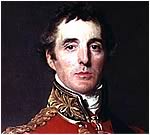Arthur Wellesley, 1st duke of Wellington

Arthur Wellesley was born in 1769, either in Dublin or at Dangan Castle, County Meath, the younger son of an impoverished Irish peer.
An army lifeHe was a graceless, rather lonely boy, educated at Eton public school and the Angers military academy in France. Although not intellectually bright, he took to military life and, at the age of 18, became an ensign in the 73rd Highland Regiment. In Ireland, Wellesley lived the frivolous life of an aristocrat, gambling heavily and playing music. He became the Irish MP for Trim from 1790 to 1795, then a lieutenant general. When war against France was declared, he burnt his violin, and commanded a regiment in the Netherlands. Sent to India in 1797, he packed a small library of books for the voyage and made his military reputation by winning spectacular victories over Tippoo Sahib, the sultan of Mysore, in 1799 and over the Maharattas at Assaye and Argaum in 1803. Napoleon called him a 'sepoy general'.
After returning from India in 1804, he married Kitty Pakenham, whose family had previously rejected him because he had no prospects. His second proposal was by letter, before he had seen her again. Fatally, the couple had little in common. He'd become imperious, dedicated to military discipline and easily upset by disorder; she was frivolous.
The Peninsula and WaterlooWellesley became Tory MP for Rye in 1806 and was chief secretary for Ireland in 1807-9. In 1809, he was given command of the British forces in Portugal, where his attention to detail and ability to switch from defence to attack boosted the campaign against the French. Despite setbacks, his many victories in the Peninsular War include Vimiero, Torres Vedras, Salamanca, Badajoz and Vitoria. He was an expert in logistics and supply, and always chose his ground well. And he ruled his men with an iron hand.
At the battle of Talavera, he earned his first title, Viscount Wellington. He was created the 1st duke of Wellington in 1814 after taking the victorious British army into France from Spain. Then, following Napoleon's escape from Elba, he was recalled and took command of the allied forces in 1815, winning the battle of Waterloo – which he called 'a close-run thing' – on 18 June. Cool under fire, Wellington was mainly an infantry commander and never used cavalry or artillery with Napoleon's imaginative flair.
Public and private lifeFor the rest of his long life, Wellington was at the centre of political life in Britain. He became a trusted diplomat in the creation of a stable Europe after the Congress of Vienna in 1815. As master general of the Ordnance, he became a cabinet minister in 1818. During the 1820s, he was involved in foreign affairs, becoming prime minister from 1828 to 1830. When a crisis in Ireland erupted, he granted Catholic emancipation rather than risk civil war.
Attacked by ultra-Tories, he tried unsuccessfully to rally conservative opinion by attacking parliamentary reform. In 1832, he bowed to Lord Grey's Reform Act by leading 100 Tory peers from their seats in the Lords, preferring reform to the swamping of the Lords with new peers. As an elder statesman in the 1840s, he served in Sir Robert Peel's Tory ministry.
After Waterloo, and despite his scorn for popularity, the 'Iron Duke' was a national hero, and his unmistakable hooked nose became a staple of cartoonists. Politically conservative, he frequently called the British soldier 'scum' and blocked demands for army reforms. When Harriette Wilson, a former mistress, tried to blackmail him by threatening to publish her scandalous memoirs, he sent the letter asking for money back with the words 'Publish and be damned' scrawled on it.
Whatever his private life, Wellington's public virtues of probity, dignity and discipline had a huge influence right up to his death in 1852. His military reputation remains good, but his political record is much less impressive.

0 Comments:
Post a Comment
<< Home